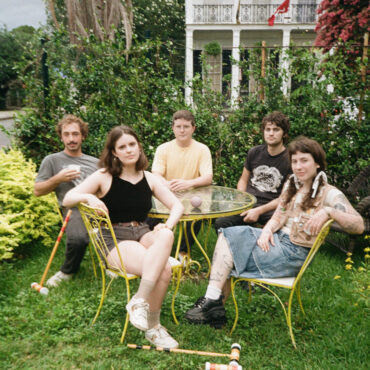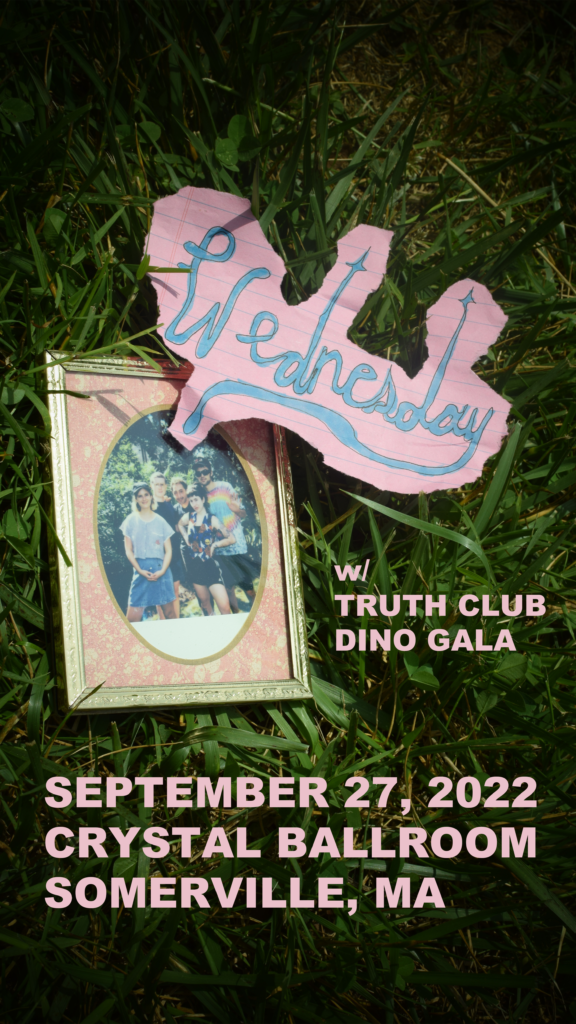
Photo Courtesy of Dead Oceans
Asheville, NC quintet Wednesday have had a big two years by any metric. The twangy shoegazers released their sophomore LP Twin Plagues to rave reviews and set out on a series of tours in support of acts like Beach Bunny and (their collective personal heroes) Drive-By Truckers, while gaining recognition around the indiesphere for their unique blend of big hooks, crushing guitar squall and sighing lapsteel textures. A short headline run at the tail end of last year touched down at a very sold out Cambridge Elks Lodge, and we can confirm the night was a steaming and sweaty mass of sound that sent bodies flying all around the basement. Following a now beloved covers album who’s smashing success bucked convention, Wednesday recently announced their signing to Dead Oceans with the dense and sprawling “Bull Believer”. Their longest track to date, “Bull” runs through a couple different song sections and moods before culminating in fronter Karly Hartzman’s pained screams to “FINISH HIM” like the Mortal Kombat game blaring out the screen in the song’s haunting video. We thought the song was a smash when we heard it live in its infant stage last November, but the recorded version is an entirely different beast, in the best way,
Wednesday hits Somerville’s Crystal Ballroom this Tuesday, September 27th alongside the excellent fellow Carolinian noise pop troupe Truth Club, and locals Dino Gala. Ahead of the gig we had a chance to chat with Hartzman about the band’s approach to music, her use of literary influences, and basketball, and you can read all about that below. Also, we’re running a ticket giveaway for the gig! So please enter for your chance to win two tickets via the form below.
Allston Pudding: How did you arrive at this sound? Is it a conscious thing or just the result of the five of you playing together?
Wednesday: It feels just like a blend of the five of us and our different tastes, we don’t pass up on any idea either of us wants to bring to the table. It’s also just the result of the love we have for the instruments we bring into the band, like whenever you add Xandy [Chelmis] on lapsteel it’s gonna have a country influence no matter what. We just wanted to play loud shoegaze and it just sorta ended up this way.
AP: The covers record seemed to really take off in a way that may have been unexpected? What about those songs spoke to you as a band, and is there a connective thread between them?

Flyer courtesy of Crystal Ballroom
Wednesday: You know those songs all date from a long period of time, like the songs I just did with Jake [Lenderman] were recorded years ago. But really any time I decide to do a cover it’s because I’m singing it in the car and it matches my vocal because a cover is never gonna sound good if the vocal isn’t in your range. We never expected it do as well as it is, covers albums are usually just a fun project strictly for the band, but this has been a surprise for us.
AP: Richard Brautigan was an author I revisited a lot early on in quarantine, and then I heard your first record not too long after and was blown away by the connection. I’d love to hear a bit more about the effect his work has had on your music?
Wednesday: I feel like my writing is influenced so much by what I’m consuming at the time that it’s being written, whether it’s movies, other music, podcasts, stuff my friends are saying, or anything else. Richard Brautigan just has so many of those like “two words next to each other” type thing that is so mind blowing to me, so those really stuck with me and I just took it as a challenge to include some of his phrasing and write the rest of a song around it as an attempt to approach the quality of his writing in my own words. I see him as a benchmark for the kind of creativity with language that I wanna demand from myself.
AP: So you had this tweet about the term “blue collar” and the way that it’s kind of bastardized in music writing that really resonated with me. Is that kind of branding limiting to you?
Wednesday: I don’t find it limiting as much as I find it unnecessary or irrelevant because when you think about what the term “blue collar” really means it’s kind of incorrect. You can describe the place where people are from without it. When you talk about blue collar you’re talking about economics, and you generally have no idea where people are at with that when it comes to being in a band, and you can get tripped up in that language. It just seems like a weird assumption to make and I find that a lot of journalists, while I get where they’re coming from and why they might use it, do use as a way to kind of quaintify a band that’s just not from a big media city. I often see journalists that are from New York or other places that haven’t spent much time here jump to that word a lot quicker than say someone from here or the midwest or other places where being outside the city doesn’t necessarily mean you’re working in a factory or whatever else. I just think it’s a weird assumption to make unless the band themselves are priding themselves on that language, like Oasis or something where they make it a part of the band, but that’s not what we want to aspire to.
AP: I totally understand what you mean, that word can be meant to encapsulate a lot, but it mostly just ends up sounding hollow.
Wednesday: We’ve been written about in that way before and it’s bothered us and a friend of mine a little, but I just didn’t think I was in the place to defend my view on this like I am now. I’ve taken kind of a firm stance against that kind of branding for us at this point.
AP: Compared to how little location matters for east or west coast bands do you feel a sort of responsibility to show off “the south” and in a positive light to listeners?
Wednesday: I don’t feel a responsibility as much as I want to do it because I love where we are from and I don’t think it’s a perspective that’s really present as much. Obviously there’s plenty of artists from the south that don’t push that to the forefront, but I love bands that are really proud to rep where they’re from, like R.E.M. and other bands from Athens in that era, I just thought that was really cool to instill a sense of pride in that community by being a successful band from there. I feel like Enumclaw is really doing that now with Tacoma as well. It’s great to see bands try to become a source of pride for their hometown.
AP: It’s very easy to be into indie rock or dance music, or art in general in places on the coasts as opposed to elsewhere.
Wednesday: Yeah, the only live music in Greensboro I could see was pop punk and then it took me a really long time to realize “ok I’m into music, but not this music.” It probably took me until college.
AP: How would you define the Carolina music scene now? Is there a cohesive sound and attitude?
Wednesday: There’s bands I went to school with that kind of influenced what’s going on. I think the biggest melding of styles has to do with the bands in our really small circle, and most of us live in the same neighborhood. Our next door neighbors both have bands of their own and then I live with Jake who has his own band [MJ Lenderman]. It feels like our friend group influences each other a lot, but there’s not as much communication on a wider scale, especially when we talk cross-genre communication. There’s hardly any right now, at least.
AP: A lot of articles about “Boston” tend to reflect back to Dinosaur Jr, Pixies, Lemonheads, Julianna Hatfield, etc. Is there a similar sort of thing with Superchunk and Archers of Loaf? Like ghosts of indie rock past?
Wednesday: It’s funny you say that because I had no idea Superchunk and Archers were from North Carolina until really recently, or that even Merge was in North Carolina because I just didn’t realize that that kind of thing could happen here. Also, I wasn’t into digging into music history as much as Jake was, but he is into all that stuff and would tell me the lore. So I kind of just found out about that, but weirdly enough I don’t think that it’s really relevant here. I’ve only recently tried to channel some of that energy into what we do, I’ve always been into that music, but I didn’t realize it was from my home.
AP: How was the experience of touring with Drive-By Truckers? Did they impart any road wisdom for you?
Wednesday: Oh yeah, everything has happened to them in the world. More than anything they were making sure we knew that if we ever needed anything in the future, any sort of questions we could always just ask them. So I feel like less than general wisdom and tips and more than we have music dads for life now. We really do have a growing list of people who have literally seen it all in our corner. Like Owen who ran our last label Orindal is someone I ask for things a lot, whereas I feel like the Truckers I could go to for advice on how to deal with our access to alcohol and drugs on tour and how to handle it if something gets out of control with that, or with emotional stuff within the band because they have a lot of experience with that kind of stuff since they’ve broken up and gotten back together and figured stuff out a bunch of times in different ways. It’s more just having a safety net of wisdom for the rest of my career, which is crazy. In general the Truckers were mostly just sweet to us. After every show they would hang out, and come up to us like “we love your music so much, we’re so glad you’re here with us” and that alone, getting validation from a band we worship every night, was invaluable.
Wednesday plays the Crystal Ballroom in Somerville on Tuesday, September 27th alongside Truth Club and Dino Gala. Tickets are available right here.
